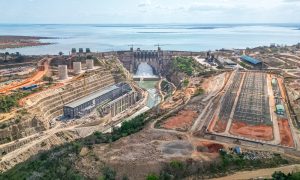The price is right
What is the true role of cost consultants and are they really needed to make sure a project stays on budget? Neha Bhatia investigates

Spurred on by the anticipation surrounding the upcoming World Expo 2020, developers in Dubai and the UAE have rapidly increased their planned developments in the country. To guard against a repeat of the mistakes of 2008—2009, cost consultancies are hoping to encourage market awareness about investment and risk management in the client community. However, what can they actually offer clients in return for a say in the decision-making processes?
“A lot of the work we’re undertaking with clients across the UAE involves putting together capital expenditure models for them, based on benchmarks from our previously delivered projects,” reveals Paul Maddison, partner and head of cost and commercial at EC Harris UAE.
“There is a greater appetite now to involve construction stakeholders early on in the project, mostly due to the lessons learned from the market crisis of 2008-2009,” Maddison explains. His current strategy is to show clients the viability of their intended projects in comparison with the existing market stock. Maddison believes this will go a long way in projecting sharper estimations of future demand for clients.
“Dubai has the expo coming, but the market is relatively quiet at the moment. Some of the big developers are seeking opportunities, but we suspect there might not be enough contractors to build to that scale.”
Maddison’s words are perhaps at odds with the UAE’s currently buoyant market sentiment among developers. Erland Rendall, director for Currie & Brown’s operations in Dubai, tells Middle East Consultant that this type of cautious viewpoint is what cost consultancies will typically offer clients.
“In basic terms, cost management can provide context to the client. A major component of a project, even in its inception stage is its financial aspect,” Rendall asserts.
“It is at that stage in the lifecycle when a cost consultant would engage to provide high-level strategic inputs that can enable the progression of that idea into reality.”
He continues: “These inputs continue to enhance the project through the design, procurement, construction and even operation and maintenance stages of a development.”
However, he admits that designers may offer resistance to their involvement. Advocating for their creative independence, designers could view cost consulting as hindering their final output. Rendall argues for a fair judgment of cost consulting based on its merits as a reality check, instead of viewing the discipline as a restraint on artistic fluency.
“That view that cost consultancies are the ‘buzzkill’ in the project is a traditional misconception,” Rendall quips. “It’s almost like a psychological barrier. A creative individual wouldn’t want to be constrained by practical elements like budgets, and that is understandable, but someone handling finance for the client will obviously worry about too much extravagance from the designer.
“In reality, you want to strike a balance between the client’s ambitions – be it a circular structure or the world’s tallest building – and what is truly achievable within his budget. The cost manager should look to facilitate and enable that ambition in the most economical way, not kill off the idea or the dream,” the Currie & Brown director says.
The depth of services that cost consultants can offer, according to Tim Sephton, CEO of Reaction Project Management, ensures their involvement through the entire lifecycle of a construction project. This impacts other parties, such as project managers like himself.
Sephton admits there is no end of agitated contractors – and other parties directly affected by cost consultant decisions – in the market. However, he is a believer in the benefits that cost consultancies can offer through construction progress and project performance reviews.
He says: “On one hand, it is critical that designers hand over quality information to cost consultants in order to ensure the latter can draw from their experience and historical data to appropriately review the design.
“Cost management provides an exact outlook about the financial aspects of a project. During construction, factors such as payments for designers and contractors can have a huge impact on the clients’ budgets.”
Sephton continues: “Cost consultants ensure these payments are made only after all terms of the contract have been met, and this significantly impacts clients’ capital. It is unfortunate when cost consultancies are used as mere budgetary tools as against frontline devices to monitor project progress.”
Benoy Kurien, general manager of Al Hamra Real Estate Development in Ras Al Khaimah is full of praise for cost consultancies. On a scale of one to 10, he rates their significance in a project at a “very high” 7.5, declaring cost consultancies as a critical part of the client’s support system.
“At the end of the day, a client is not a technical person,” Kurien concedes. “He or she may be surrounded by an army of technical experts for support, but generally, most specialised aspects of a project are outsourced to the right experts from relevant fields.
“The client has to arrange his priorities to ensure project clarity; the role of value engineers ends here, however. Cost consultancies are involved in the intricacies of construction processes; for instance, a cost consultant could recommend alternative product options which could reduce costs by, say, 25%. In my opinion, that is the role of the cost consultant,” Kurien opines.
Industry experts have, in the past, told Middle East Consultant (issue #3; March 2014, p.26) that the UAE’s architect pool is progressing towards a broad segregation into in-house architects, who work with contractor and developer firms, versus those who choose to work with pure architectural practices. However, EC Harris’ Maddison believes that cost consultancies, due to the extensive information that contributes to their core competency, are better suited to an independent business model.
“There is scope for cost consultancies to contractually merge with clients, but doing so would lead to problems in data accumulation. Autonomous consultancies tend to have better reference points from across the market, as against an in-house consultancy, which may have niche information about only its own client.”
Kurien offers his five cents on in-house cost consulting: “A lot of clients today develop these competencies in-house since their benefits to seasoned developers are greater.
“Clients who have dealt with multiple project managers, cost consultants, value engineers and so on over the years will seek to form an ideal in-house technical team for themselves. However, this doesn’t mean no work is sent out for independent agencies to handle. In-house technical teams, for large clients, often end up monitoring various aspects of their project, which have been outsourced to the market,” Kurien explains.
“In-house or independent, I think cost consulting rates pretty highly in the scheme of things on a project. It has direct impacts on profitability, for one. If you can’t increase your revenues, then you will have to reduce your expenses, and cost consultancies help with exactly that,” he adds.
Rendall agrees the construction industry tends to pigeonhole the role of cost consultants. “Culturally, the construction industry is fragmented and players tend to focus on themselves. It is fairly normal for us to get the typical ‘it’s none of your business’ comment from other parties involved in the project, but the industry has to work progressively project success.
“There are a number of stereotypes associated with cost consultants; tags like ‘accountants’ or ‘brick counters’ are frequent. We’re even compared with quantity surveyors, but what they do is an aspect of the overall value-added services cost consultancies offer, such as value assessment, risk management and so on,” Rendall protests.
“The general assumption is that someone else creates the product and we only measure it, which is wrong; cost consultants also focus on the legal, procurement and other such aspects of a project.”
Maddison argues that a fresh mindset is also required to accept that cost consulting services show the worth of capital investment in more than just currency terms. “The main stereotype is just the definition of ‘cost’, which is viewed as an outflow,” he says. “Nobody likes the guy who wants to control the money flows.
“We’d like to think that as cost consultants, we optimise the client’s spend, and it is this optimisation that generates revenue or returns for the public. Our main objective is to achieve what the client wants, and cost management is crucial to ensuring best returns on a project.”























